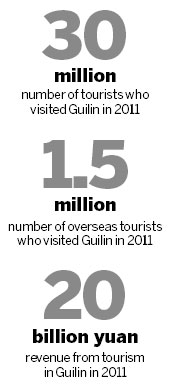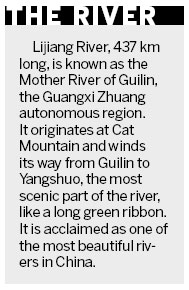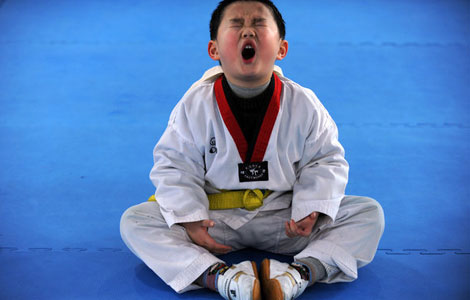River protection rules cut into incomes
Updated: 2012-01-19 08:25
By Wang Xiaodong and Huo Yan (China Daily)
|
|||||||||||
|
Clockwise from top: Rafts scattered at a harbor in Xingping township, the Guangxi Zhuang autonomous region, last week; Yang Guihua, used to be a fisherman, now makes money by charging tourists to be photographed with his two cormorants; Zhao Ping, a fisherman in Xingping township, rafts on the river trying to pick up tourists when he's not fishing. [Photo / China Daily] |

NANNING - The government is pledging to compensate residents along one of China's most scenic rivers whose livelihoods have been affected by new rules to protect the waterway.
The regulations, which took effect on Jan 1, were adopted to protect the 437-kilometer Lijiang River in South China's Guangxi Zhuang autonomous region. The rules, which ban fishing, private rafting and restaurants along key-sections of the river, are expected to set an example of protecting over-exploited tourism resources in China.
"The regulations will definitely affect the livelihoods of residents along the Lijiang River," said Liu Jun, Party chief of Guilin city, the site of one of the most beautiful parts of the river.
"However, we will soon establish a compensation plan for the residents who have to sacrifice their interests to protect the river. The government will also encourage the residents to develop industries that are friendly to environment," he said.
According to a report by the autonomous region's Legislative Affairs Office last year, violations of environmental laws - such as wastewater pollution, sand quarrying and illegal logging - were rampant along some sections of the river, prompting the region's government to draw up the regulations.
The Lijiang River is a tourist magnet. In 2011, Guilin alone was visited by 30 million tourists, 1.5 million of whom came from overseas, according to the city tourism bureau. Revenue from tourism totaled 20 billion yuan ($3.2 billion) last year.
But residents said the new rules are reducing their incomes.
In Xingping township, Guilin, a woman surnamed Liao said she used to be able to earn 300 yuan a day carrying tourists on her raft. There were more than 600 rafts owned by villagers on the river each day during peak season.
The new rules require villagers to sign contracts with licensed companies to offer rafting services. Under the contracts, they must raise the price of the service.
"Today I haven't seen a tourist willing to buy a ticket to get on my raft," Liao complained.
"The price is too high now. Last year we would take a tourist for just 30 to 40 yuan, but now they pay 98 yuan for a ticket, and we can't lower the price on our own because it was set by the company."

That tourism company, Lijiang Scenery Management Co, adopted unified policies for all rafting businesses in the town on Jan 5, said Ni Yalin, vice-president of Liqing Co, a subsidiary of the company.
"All the rafts along the river were privately owned, and it was not safe enough for tourists. Accidents during peak season were not rare. Now, we register every one of them and limit the number of tourists each raft can carry. It's in the tourists' interest in the long run," he said.
The company's measures were also meant to limit the number of rafts on the river, Ni added.
"We aim for orderly and long-term development of the tourism industry," said Long Yanqiu, publicity chief of Yangshuo county, Guilin.
Part of the government's tourism revenue will be given to Yangshuo county residents, so those who sacrificed their income for the protection of the Lijiang River environment will also get a share, Long said. She didn't elaborate.
Zhao Ping, a fisherman in Xingping, rafts on the river trying to earn money carrying tourists when he's not fishing.
"The high ticket price has scared tourists away. Plus, this is the off-season. I don't expect to earn anything more than 20 yuan a day," Zhao said.
Yang Guihua, who used to be a fisherman, now makes money by charging tourists to be photographed with his two cormorants, each fastened by a belt to the end of a pole. They shoulder the pole like fishermen and pay 5 yuan for picture.
"I can make 200 yuan a day when business is good," Yang said. He said it is more difficult to catch fish in the river and he gave up that profession years ago.
"Even if the government limits fishing in the river, it won't affect my life much," Yang said.
But some people who depend on fishing for their livelihood are having problems.
Huang Yousong, a 70-year-old fisherman in Yangdi township, said there are not enough fish in the river nowadays because their populations have been greatly depleted by the widespread use of electric nets.
"As soon as night falls, you can see fishermen on the river using electric nets. The rest can't catch fish anymore."
Lacking a source of income, Huang receives a 250 yuan monthly subsidy from the Guilin government, but the payment is sometimes late.
"I wish the fishery administration would listen to us and take measures to stop electric fishing," Huang said.
Wu Ruqing contributed to this story.
Related Stories
Guilin never ceases to amaze 2011-03-09 09:43
China vows to strengthen inland waterway transport 2011-01-30 20:13
Environmental protection policies 2011-08-18 11:19
Environmental protection good for growth 2011-03-02 07:43
- Housing sales fall 15% in major S China city
- China publishes first industrial restructuring plan
- Yang's Yahoo departure changes rules of the game
- Apple stores sales ban gives boost to rival outlets
- Doing one's best for the boom brand
- CNOOC expects higher output in 2012
- FDI registers drop in Dec
- China heads for soft landing









